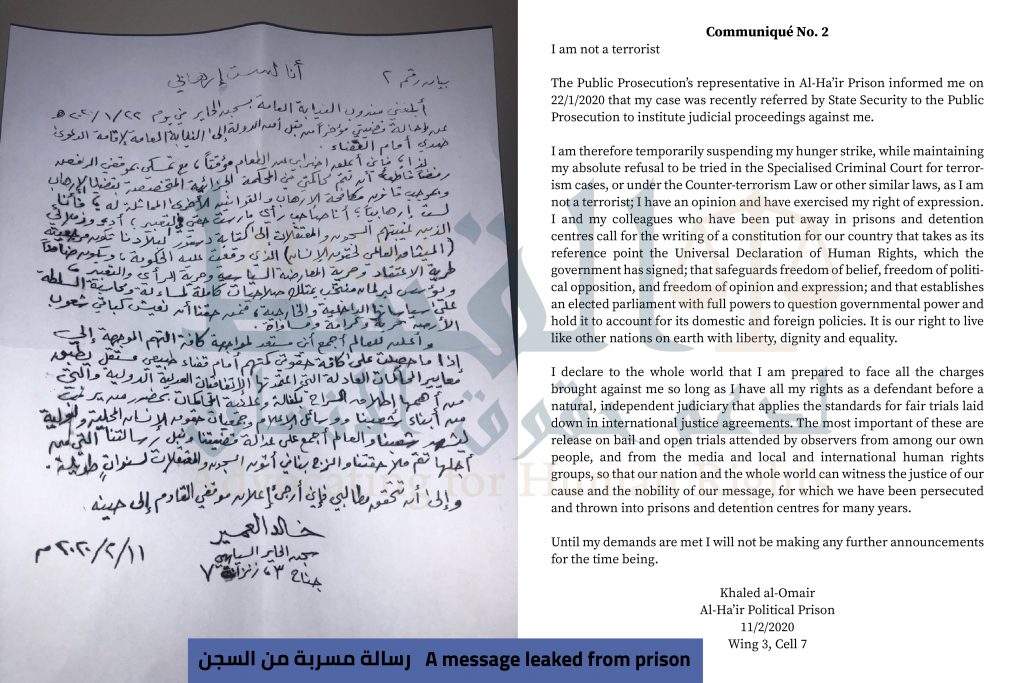
In a letter smuggled from inside the Saudi prison system, detained human rights activist Khaled al-Omair has announced the suspension of his hunger strike from 11 February 2020, after the Public Prosecutor’s Office informed him that his case had been handed over to it by State Security.
Al-Omair regarded this as partly meeting his demands, the main one being for him to be brought to court.
Meanwhile human rights activist Walid Abu al-Khair has announced that he ended his own hunger strike, after nearly two months, on 6 February 2020 after he was transferred from high security detention back to his previous prison accommodation. Abu al-Khair, al-Omair and others went on hunger strike in protest over their poor conditions and harsh treatment in prison.
Towards the end of November 2019 Abu al-Khair’s cell was raided several times, and he was taken in handcuffs to be placed in the sun as a punitive measure several times as well.
On 27 November 2019 Abu al-Khair was taken to the high security unit, bound hand and foot, and it was this that led him to begin his hunger strike.
He only broke his strike on 10 December 2019 when they returned him to his previous prison accommodation; but then on 11 December his cell was raided again and he was once again taken, this time together with Raif Badawi, to high security.
Abu al-Khair then went back on hunger strike, just one day after having broken it, and Raif Badawi joined him in the strike. On 9 January 2020 eye witnesses contacted ALQST to say they had seen Walid Abu al-Khair in hospital in a poor state of health.
ALQST later received confirmation that Abu al-Khair was back in high security, the very day after being force-fed with nutrients in hospital, his health having deteriorated as a result of both his hunger strike and medical negligence by the prison administration.
Badawi continued his hunger strike until he was returned to his prison cell. Abu al-Khair continued until he was let out of high security, and announced he had stopped his hunger strike on 6 February 2020 now that this demand had been met.
On 22 December 2019 ALQST received a letter smuggled from inside the Saudi prison system, written by human rights activist Khaled al-Omair, in which he announced that he was joining the PoCs’ hunger strike and invited other PoCs to join it too.
He said he was protesting at being imprisoned without trial, against the authorities’ muzzling of free speech, and against the harassment, repression, arrest and torture of people expressing their opinions.
On 11 February 2020 ALQST received another letter in al-Omair’s handwriting, announcing the temporary suspension of his hunger strike in view of the authorities’ meeting his demands in part by initiating judicial proceedings.
He also affirmed his absolute refusal to be tried in the Specialised Criminal Court (SCC) and rejection of unfair trials held in secret.
As well as announcing the end of the PoCs’ hunger strike, ALQST calls on the authorities to meet their responsibilities towards all prisoners; urges them to completely stop their inhumane and degrading practices and put a stop to all forms of torture; and calls for the immediate and unconditional release of all prisoners of conscience who have not committed any crime by law.
ALQST maintains that Saudi trials are not fair; that the Specialised Criminal Court (SCC) is not competent to hear the cases of prisoners of conscience; and that the court’s regulations and the Counter-terrorism Law allow the authorities to use the SCC and the Law to repress Saudi society and punish peaceful activists.




